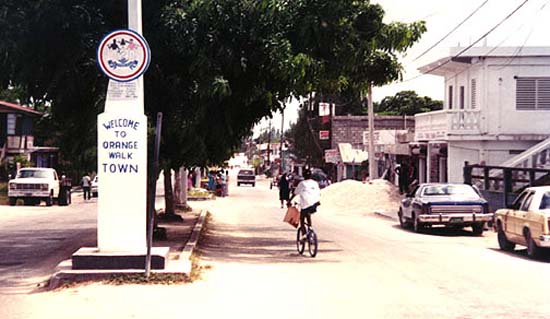
A member of one of the first groups dispatched in 1962, Mr. Webbeking was posted in Belize City
A member of one of the first groups dispatched in 1962, Mr. Webbeking was posted in Belize City
Beloit and the Peace Corps: Adventures in Service
“... So we’re lying there under mosquito nets, unable to sleep and wondering what kinds of lizards and spiders are lurking about. That day, we had driven through Freetown and were utterly shocked—stunned even—by the poverty we saw. And all I could think was, ‘What have we gotten ourselves into?’”
It was 1969, and Michael’69 and Eileen Grennan May’69 had just arrived in Sierra Leone, where they would spend the next two years as Peace Corps volunteers. They, like so many Beloiters before and since, sought a way to “...do something constructive, while broadening our understanding of the world.” A stint in the Peace Corps seemed just the ticket.
The Peace Corps may be the best known service program in the United States. Over four decades it has sent more than 160,000 citizens to work in Third World and developing countries. Beloit College is a leading producer of Peace Corps volunteers based on school size; recent records show that 227 alumni have enlisted, and 12 are serving at this time.
Working in the Peace Corps isn’t easy. Volunteers who persevere through a typical two-year assignment (and some do not) live in countries and conditions that range from primitive to grueling. While they receive in-country training and administrative support, many reside in isolated communities, with few clear directives. Most rely on tenacity and ingenuity to succeed.
Vic Webbeking’61 found that a standard-issue medical kit also came in handy. A member of one of the first groups dispatched in 1962, Mr. Webbeking was posted in Belize City, British Honduras (now Belize). Ostensibly there to teach high school students, he was soon providing first aid to local citizens.
“Another volunteer and I lived in what was basically a home for delinquent boys,” he says. “People started asking us to treat wounds and ailments. So we ran a clinic, which we had no business doing, except that the people coming to us had no alternative.”
Almost 30 years later, Tim Dowd’89 and Nancy Atwell’89 adjusted their approach to meet the needs of 200 villagers in Santiaguillo, Ecuador. Although Tim had trained in agricultural pest management, his focus soon shifted.
“I tried to help farmers use fertilizers properly,” he says, noting that many such chemicals were highly toxic. “I would suggest to one farmer, ‘Let’s do an experiment on your field,’ and if it worked well, we’d try to develop new planning and planting techniques.”
Ms. Atwell worked at introducing new crops, including okra, broccoli, and zucchini. Her efforts were mostly successful, but she realized that her gender limited her influence.
“The reality is that sometimes farmers wouldn’t pay attention to me in the way that they would to Tim,” she recollects. “So Tim and I tried to set an example by basic living—we shared the cooking, cleaning, digging, and hauling, and I handled difficult jobs as would any man. And some villagers recognized it doesn’t matter that I am a woman.”
Today’s volunteers are often young, single women. Alyson Carr’98 served in Namibia, an experience she likens to living in a friendly fishbowl. “People always knew where I was and what I had done,” she says. Her days as a teacher-trainer “... gave me confidence to change. I learned to find creative solutions to problems, and work with teams. I found different values and ways of thinking, and realized that much of the world lives without things Americans take for granted.”
It is a perception that Paul Fishstein’76 appreciates. While in Afghanistan in the mid-’70s, Mr. Fishstein witnessed a military coup that transformed the country’s political system overnight. At the time, he was living in a small town near the Soviet border, teaching English and coaching basketball. “At noon the radio went dead, then a local military guy showed up,” he says. “We were astounded.” He did not witness violence but heard harrowing stories from friends in Kabul. Shortly after, he completed his service, and the Peace Corps pulled remaining volunteers out of Afghanistan. “It was grim leaving Afghan friends behind, not knowing what would happen to them.”
Alumni of the Peace Corps often consider their years of service to be a defining experience. Some recall it positively, others with ambivalence, wondering if they truly helped their host countries and questioning the United States’ role in world affairs. Most use the episode as a springboard for subsequent interests and achievements. Even those who suffer extreme hardship can put lessons learned to constructive use.
After an initial rocky start, Michael and Eileen May adapted to Sierra Leone and worked as an agricultural manager and teacher-trainer, respectively. A week before they were to leave, a kerosene stove blew up, severely burning Eileen. Her recovery process—although prolonged and excruciating—inspired her to become a doctor. Neither she nor Mr. May regrets the choices that led to her cooking over the stove that day in Sierra Leone.
“It wasn’t easy, but it is the best thing we ever did,” Dr. May says. “We developed a different set of priorities, and learned to not be afraid to be different. If one of our children wants to join the Peace Corps, I would highly recommend it.”
